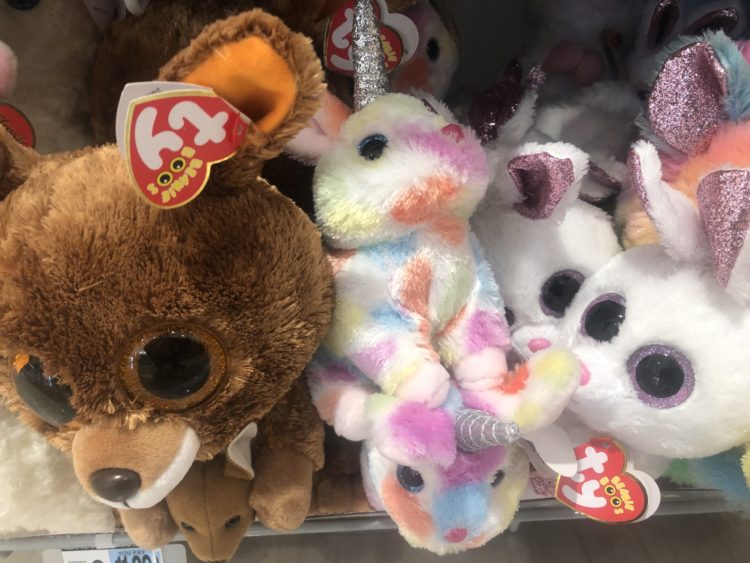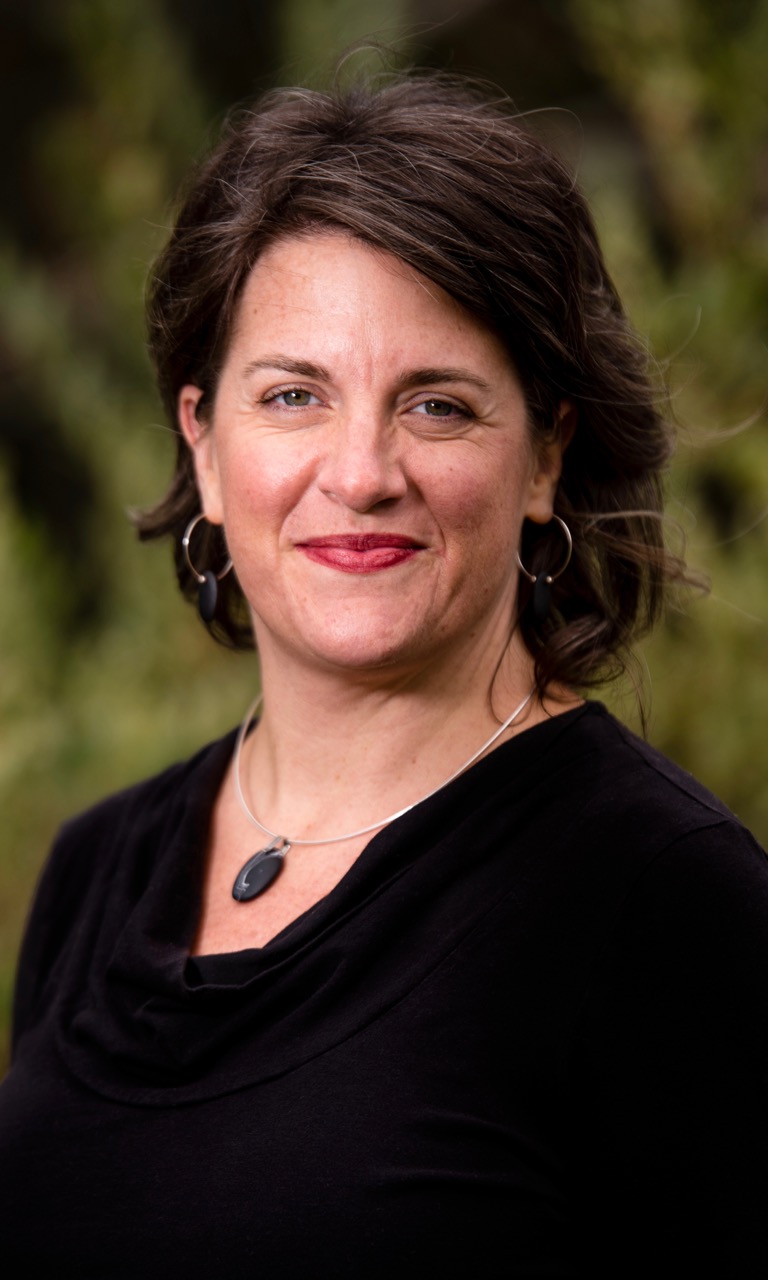
Beanie Babies for sale at a national drug store chain
Seven weeks later, it ended — in lock-step with the economic collapse and blooming coronavirus pandemic. I had just finished moving into the sweet little stone cottage for which I’d signed a one-year lease, and suddenly I didn’t know how I was going to pay the rent. Every newsroom in the region had already been forced to lay off, cut back or furlough, so the prospects were dim for finding a new journalism job, or quickly rebooting my freelance business.
While shopping for toilet paper one Wednesday afternoon — I was down to one roll — I noticed a sign outside the drug store: “Now Hiring. Flexible Shifts.” Economists were predicting record unemployment claims for the week, but the drug store was hiring.

Hilary Niles found temporary employment as a drug store clerk before a part-time journalism job came her way
The next day, I put on my boots, drove to town and applied.
Much to my surprise (as a mid-career journalist with a master’s degree, I’m a bit other-overqualified), the hiring manager brought me on as a shift supervisor.
I expected the job to suck. It delivered. I’m not adverse to hard work. Heck, I used to farm and bartend. But eight-hour shifts on your feet in fluorescent light is draining in a different way. The type of toil that got me down most was the mind-numbing tedium of pulling hundreds of sale tags off the shelves every week, only to put up hundreds more the next day. The Sisyphean task of “facing” the shelves so that every row of every item is pulled to the front somehow depressed me — not to mention the continual exasperation of knocking five items on the floor for every row I’d try to straighten.
The complexity of keeping the store stocked and the overstock inventoried was staggering; I respect the mind of a store manager who can do it well. But while spending half a day creating an end-cap of tampons for barely a living wage — even with a temporary “hero pay” bonus — I don’t recommend contemplating your outstanding graduate student loans. In five weeks, I touched every bottle of shampoo and every bag of Skittles in that store, and spent more time than I care to remember stuffing a seven-shelf orgy of Beanie Babies.
Journalism where you find it
The silver lining was connecting with customers at the register. I ran it like I ran the bar back in my days at the tavern. The drug store transactions were brief, but often rewarding — certainly for me, a lover of stories, but also, I think, for some of the customers. As I would do in a mini-interview, I challenged myself to read people’s body language and eyes, take stock of what they placed on the counter to purchase, and strike up a conversation. Journalism can be done anywhere.
I’m now Facebook friends with a writer from New York, currently a masters student in New Hampshire, who’s terrified of the virus but didn’t wear a mask and bought two packs of Newports every time he came in. One day, I helped Connie, a tall, thin woman with COPD and red, droopy eyes, who was lovely and high-maintenance and looked older than dirt. She hunched over her cart as we walked the aisles to find Pantene Curl Perfection shampoo, Vitamin C, and Aspercreme with lidocaine before she picked up her prescription at the pharmacy. Karen was a grandmother who normally split her time between southern New Hampshire and northern New Jersey. Her daughter, who lived in a high-rise apartment building down there, wouldn’t let Karen visit. “Stay away, Mom,” she’d say. “It’s so bad down here.” One of their family friends, a father in his mid-40s named Mike Parisi, had died from COVID-19 earlier in the week when I first met Karen. I googled him after work and found an explanatory article about blood plasma donations from COVID survivors that told Mike’s story as its lede. Then there’s the big and tall young woman who came barreling into the store after a morning workout. I helped her navigate the self-check register. “Are you on a team?” I asked. “No,” she said with a smirk. She and her workout partner had spent the morning pushing and pulling an SUV, she said, and she felt like her legs were going to fall off. She was beautiful — radiant with pride and adrenaline. Rafael (his friends call him Raffy, he told me) was a 24-year-old student from China who couldn’t get home, and all his friends had left town after the university closed the campus. The night before his birthday, he bought four pints of ice cream and stayed for 20 minutes to talk.
Mostly though, I remember a woman whose name I didn’t get, who bought the biggest package of toilet paper we had in stock one day. She wasn’t hoarding, she assured me. She was stocking up on essentials so she wouldn’t have to shop again for a month or so, because her husband was due to start chemo the following week. His lung cancer was back, this time spreading throughout his body. We stood across the counter from each other, eyes grasping for — and finding — contact. “I just feel so …” she trailed off, almost trembling, and started out of the store. “I’ll be thinking of you today,” I said. She stopped and turned back to look at me. “Thank you,” she said, and I knew that she knew I meant it.
Those and more moments like them buoyed me. I hope that the nice lady who checked them out at the drug store has been a little ray of light for the people I connected with.
Otherwise, the sense that I was swimming in coronavirus for eight hours at a time just iced the cake of how aggravatingly and incessantly complicated, yet unrewarding, that kind of “essential worker” job is. Layer this with someone’s idea of a good soundtrack on loop, and at times I actually thought I might lose my mind. And don’t even get me started about the candy aisle, because there is nothing “essential” about the ungodly volume of individually wrapped Cadbury eggs that crossed my counter over Easter Weekend.
Cultivating possiblities
Thankfully, my “hero” status is due to terminate at the end of my two weeks’ notice. I truly felt bad about quitting after so little time, because the store was terribly short-staffed and the manager was good to me. But a working relationship that I had been cultivating since last November, reporting for the Granite State News Collaborative, at last came to fruition. I left the drug store to freelance about 20 hours per week at a decent hourly rate, producing solutions-oriented, data-driven coverage of the pandemic, its impacts and responses to it in the state. Brenda, the drug store manager, was disappointed, but she understood and said she wants to stay in touch, that she was happy for me.
And I am happy for me. While I acknowledge a pang of guilt about having the luxury of employment options when so many have none, it felt so wrong to be sidelined as a journalist during an all-hands-on-deck societal crisis. Journalists are needed to translate complex and fast-moving scientific information. Journalists are needed to point out the inconsistencies in official messages, to recognize effective public policy where it exists, and to call power to account. Journalists are needed to sit — at a safe distance — with the stories of heartache and hope that march through this pandemic as steadily as customers continue to march past the check-out counter at the drug store — even if all they come for is candy.
Of course, returning to freelance journalism is no permanent guarantee of a living wage. So to round out that income, I’ve also lined up communications work for a farming collaborative whose business is booming with a home delivery service they started in response to the pandemic. One of the three farms running the collaborative is the operation I helped a friend establish 20 years ago.
We’ve both grown a lot since then.
Hilary Niles is an independent multimedia and data journalist, and former farmer, bartender and drug store shift supervisor. She holds a master’s degree from the Missouri School of Journalism, has produced stories for NPR and the BBC, and currently chairs the Society of Professional Journalists’ Freelance Community and serves on SPJ’s FOI Committee.
